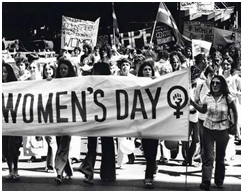What happened to the Men’s Movement?
December 12th, 2011
Much has been written recently about the Women’s Movement – the accomplishments and failures of feminism in general and the relevance of some the movement’s leaders in particular. Growing up as a young kid in the 50’s I was right at home having a mom who would never have been referred to as a ‘stay at home mom’, though that is surely what she was. As a teenager in the 60’s, being the youngest of her three, it did seem that she was the ‘unusual’ mom when she went from volunteering at my elementary school library and started working part-time at the local Doubleday bookstore. The books may have been the same but the experience was totally different – all of a sudden I was a latch-key kid with all of the requisite perks and liabilities. And mom had the kind of self respect that comes from earning her own money outside of the home. She wasn’t earning as much money as her male counterparts (nor were any or her ‘female sisters’) but at least she was expanding her horizons and getting paid for it.
The Women’s Movement aimed at shattering sexism, specifically by breaking through the glass ceiling, among many other worthy targets. Women do earn more than they did pre-feminism. There are more women executives now than ever before. And yet, when you dig into the lives of women executives (or women in general I imagine) you find ample evidence that the glass ceiling is more secure, and more difficult to penetrate, than ever. For those of you looking for some good advice on how to pierce that barrier, I recommend “Knowing Your Value: Women, Money and Getting What You’re Worth.” Author Mika Brzezinski, co-host of Morning Joe, takes an in-depth look at how women today achieve their deserved recognition and financial worth. As pointed out on Amazon (where you can go to buy the book) “it’s no secret that women have long been overlooked and under-compensated, and while great strides have made in recent decades, the value placed on women versus their male counterparts is still consistently unbalanced.”
Before we move to the point I want to make as hinted to by the title of this blog, let’s consider that while compensation is important, in oh-so-many ways (survival, recognition, self worth, organizational influence, etc.), it’s not what we’re going to hear eulogized at our funerals. If you are a working (outside the home) mom and you’re interested in that kind of fullfillment, and I’m hoping you are, take a look at “The Working Mother’s Manifesto: This is How We Do It”. This piece opens the door on the ‘less is more’ theory by recognizing that a) money not only isn’t everything, it’s not even close, and, b) when you’re willing to negotiate getting less money (for less time worked) you can get more of what you really want, time for yourself and time to spend with the people you love. This is where Carol Evans, the author, and CEO of Working Mother magazine, encourages working mothers (and fathers) to ask their organizations for what they need to attain a healthy balance between work and family.
So, that last parenthentical phrase “(and fathers)” is where I’m heading. Yes, we had a Women’s Movement, and much progress was made, certainly not as much as we’d have liked, especially when it comes to equity in compensation, but progress nontheless. What’s been missing is a movement of equal size and weight for men. About men. By men.
Now I’m going to say something that many of you will rail against. You may even curse, and moan, and some of you will want to throw things and some of you will definitely want to stop reading. Please don’t! Bear with me a minute. Here it comes…
Men are the oppressed gender. There, I’ve said it. Ok, please put down whatever it was you were about to toss in my direction. You may even want to take a deep breath. Let’s take a look. Together.
When it comes to what really, really matters in life, what are we talking about? Yes, money and the attending comfort and security that it brings are huge. But let’s face it, how many eulegies have you heard that focused on how much money that person had? Or that even mentioned money? I’m guessing none, or at least very, very few.
What we do hear, and not just at funerals but at retirement banquets, testimonial dinners, toasts at family events is how much love people had in their lives. How much love they gave and how much they were loved. It is in this category that men are culturally at a severe disadvantage. At least through my generation (Boomers) we were told not to cry (“be a big boy now”), not to be ‘weak’ (“suck it up”) or even talk about our feelings. We were expected to be the bread winners (at least that’s changed generationally) and though we could help change diapers and share in the household chores it was the rare man who elected to be a stay-at-home dad while mom brought home the bacon. Yes, many of us did break a few barriers, mostly through the requirements necessitated by being a dual income family. But in the end we were not encouraged to go the extra mile to ensure that we’d have the time and energy to secure the kind of deep, spiritually based connections with our kids, our friends, our families, our communities that women just naturally fall into.
I’m hoping that it’s not too late. For a Mens Movement or, better still, a Peoples Movement, where we all get to focus on the things that really matter. Time with our loved ones (and I’m not talking just a weeks vacation a year), time to reflect, time to connect, time to feel.
Happy Holidays!


 had been elected Mayor of Burlington by a 10 vote margin five years earlier and Burlington was just beginning to be a hotbed for progressive politics, food and business, my real passions.
had been elected Mayor of Burlington by a 10 vote margin five years earlier and Burlington was just beginning to be a hotbed for progressive politics, food and business, my real passions. Talk about a tough job load! Yes, I know how hard many of our CEO’s have it, especially the women CEO’s and executives who not only have to juggle the demands of employees, customers, their Board, the Street and whatever current key stakeholder has their hooks into them at any given moment. But for a minute consider Moses… when God handed him the Ten Commandments and told him he had to both lead his people out of servitude, into the desert AND institute an whole new set of policies and procedures.
Talk about a tough job load! Yes, I know how hard many of our CEO’s have it, especially the women CEO’s and executives who not only have to juggle the demands of employees, customers, their Board, the Street and whatever current key stakeholder has their hooks into them at any given moment. But for a minute consider Moses… when God handed him the Ten Commandments and told him he had to both lead his people out of servitude, into the desert AND institute an whole new set of policies and procedures.